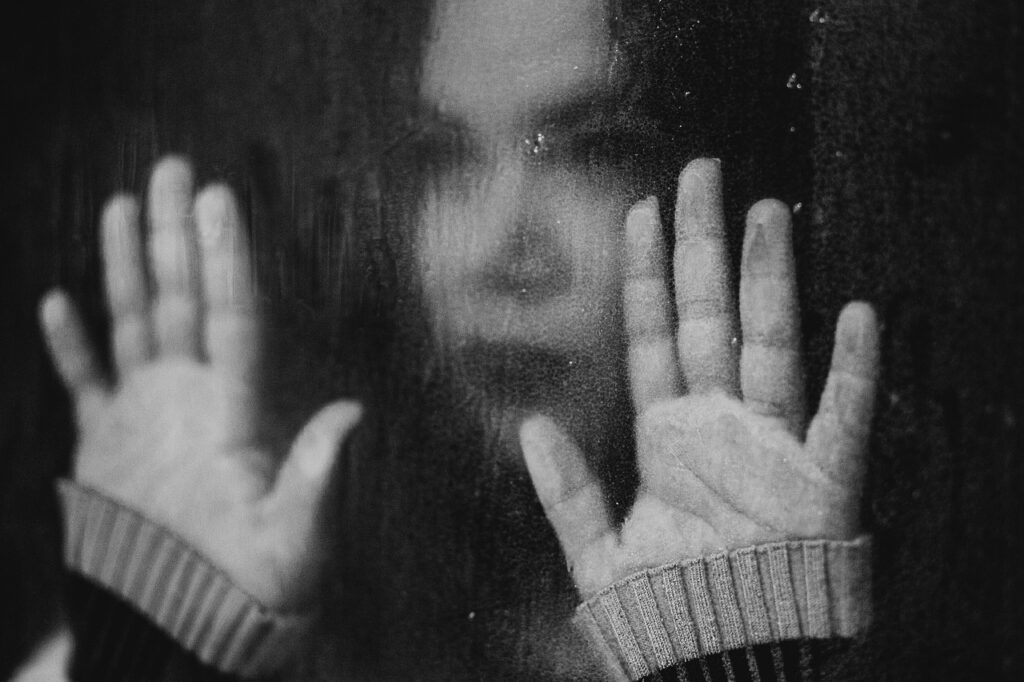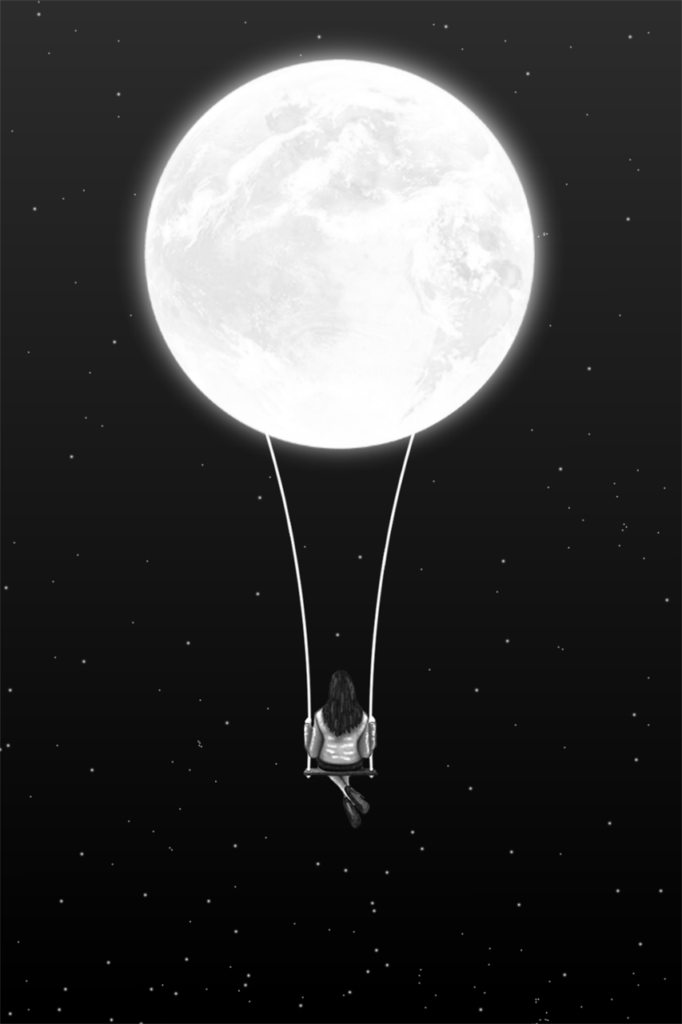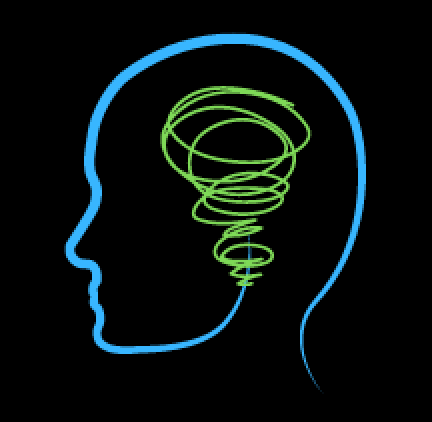Excitement drains from my daughter’s face, replaced by fear, as we swing high above the colorful lights and rush of people at Busch Gardens. I watch as her mind deceives her behind her caramel eyes with golden streaks. She begins to analyze all of the scenarios that could go wrong: a snap of a cable, a bolt jarred loose, or an imbalance in weight distribution (perhaps this one is mine). Sitting by, quietly understanding, and doing my best to relieve her worries with a smile.

Desire for a Deeper Explanation
At times, I feel selfish, signing my daughter(s) up for a lifetime of mental health struggles all because I wasn’t fully aware of what I myself was battling. My depression amplified in my college years, but it would be another seventeen years, and two children later, until I was diagnosed with bipolar II, ADHD, and anxiety.
My father instilled in me the insatiable need to understand the why and how of topics I am drawn to, such as the intricate inner-workings of the brain. This curiosity has led me down the path to self-discovery. I don’t want to just know that ADHD makes it difficult for me to stay on task, constantly searching for new ways to stimulate my neurons and keep me on track (for real this time): a new notebook, planner, keychains, a pen.
I dig deeper to understand that a decreased level of dopamine, as seen in those with ADHD, affects mood, impulsivity, inattention, and feelings of pleasure and reward. This dopamine deficiency makes it difficult to stay motivated or focused on tasks that are of lesser interest.
This leads me to piece together the puzzle, understanding why the ten colorful keychains I used to remind me of my work to-dos, to take my medicine, eat breakfast, and drink water, no longer work. The payoff of removing a bracelet at the completion of a task has lost its novelty.
Seeking Help for My Daughter at a Young Age
At the end of 2020, and the beginning of fourth grade, clinicians diagnosed my oldest with severe ADHD, adjustment disorder, and social anxiety disorder. She had testing completed again in November 2024, due to an escalation in concerning symptoms, where she was diagnosed with ADHD, generalized anxiety disorder, and emerging bipolar disorder.
My guilt is accompanied by a notion of gratitude for having faced/continuing to face my own mental health dilemmas. It gives me a window, even if tinted, to view what’s going on behind her eyes. I have fallen down the negative thought spiral and covered my ears to try to quiet my mind.
I wasn’t prepared for how young she would be when her mind began to verbally attack her; how the anxiety of fitting in and not standing out, coupled with a deflated sense of self-confidence, would lead her to search for dangerous ways to cope.
Impact of Life’s Pressures on Middle School Mental Health

I have watched heart-wrenchingly helpless as middle school, peer interactions, and family life culminated to unhealthy levels of stress and anxiety, leading my oldest to resort to restricting her eating, causing self-harm, and contemplating suicidal thoughts.
Never able to escape the worry that a moment will convince her of the negative narrative her mind is telling her in her heightened state, I am aware of how consuming her emotions can be. I am aware of how consuming my emotions can feel.
My brain too has a way of making me feel like I exist only in that negative moment. I replay the shameful thoughts or feelings which have magnified, and skewed my view, losing my periphery, and the life that exists beyond my immediate perspective.
My Brain Tells Me I’m Failing

Mom guilt is real, compounded with the negative self-talk and the continuous ups and downs of bipolar; the guilt I feel when I don’t comply to play with my daughter can feel heavy. I overanalyze my interactions, trying to view my actions from her point of view, and then I feel guilty. Guilty for wanting to write, or read, or zone out for a moment. Guilty for choosing to exist outside of her needs because God-forbid something terrible happened, and I chose not to play with her today.
My ability to keep a tidy house eludes me; the blanket-wrapped couch cushions, askew and untucked; stacks of papers from emptied out book bags; half-chewed sticks scatter the living room floor, and the dishes that seem to multiply when they hit the counter.
The shame and guilt of all of my shortcomings boil to the surface, paralyzing me, continuing the cycle.
Exploring What Works for Me
Expanding my knowledge, becoming a teacher, and allowing myself to fully embrace my neurodiversity has helped me discover a few techniques that help me stay organized and function more smoothly.
We now use an extra-large white board that serves as our home’s command hub. The calendar, bursting with colors, filled with appointments, important numbers, my oldest’s chore chart, my youngest’s token jar, and hooks labeled B, L, and D. After, probably, feeding our puppy multiple times a meal, my husband devised the method to move her scoop each meal to keep track of when she ate.
I have missed more appointments than I care to remember, and I’ve not cooked a meal that steps beyond comfort food like spaghetti, tuna casserole, or sloppy joes in months. Years? On the rare occasion I could find the motivation and energy, I walked away feeling like a chef, stellar mom, and all around amazing person. Then the next day, we’d order pizza.
My Mental Health Makes Me Feel Alone

It’s this understanding of how a mood disorder, anxiety, and ADHD intertwine that can lead to feelings of inadequacy. I create a mask, trying to cope, seem “normal,” hide the stimming, rumination, memory loss, and self-doubt.
I’ve worked hard at turning on the positivity and appearing as though I’m happy, and really really working hard to be. All while a voice in the back of my head minimizes some thoughts and interactions while catastrophizing others. And all the while, not being sure which reality to believe.


I cry for passing on my mental health, EDS and Epilepsy to my son. He has ADD as well. I have OCD not ADD. At 61, it still guts me.